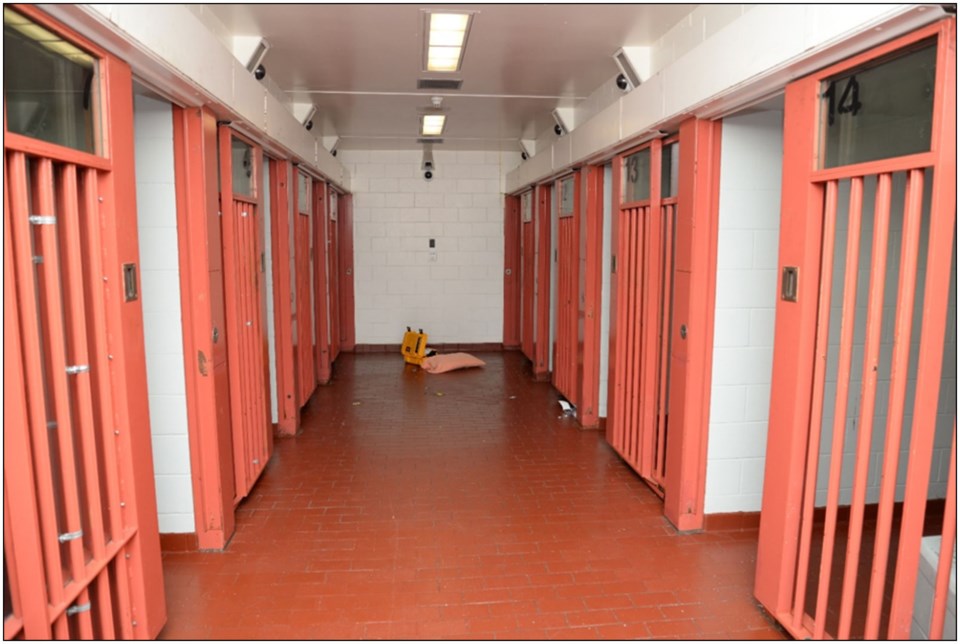THUNDER BAY - A video depicting two Thunder Bay Police Service officers dragging an intoxicated Indigenous man into a cell was presented during the coroner’s inquest into the deaths of Roland McKay and Don Mamakwa.
One of the officers depicted in the video said his actions were absolutely unacceptable but admitted it was a common practice in 2014.
“I think back then dragging people who were uncooperative was common place,” said Const. Neal Soltys. “I think that’s why I don’t think many people were very shocked. Working as a police officer, you see things civilians don’t see.”
The video was presented to the jury on Monday, the fifth day of the inquest examining the circumstances surrounding the deaths of McKay and Mamakwa.
Mamakwa, 44, of Kasabonika First Nation died on Aug. 3, 2014. McKay, 50, of Kitchenuhmaykoosib Inninuwug First Nation died on July 19, 2017. Both were in the custody of the Thunder Bay Police Service.
Thunder Bay police attempted to block the video from being included in the inquest, with its legal counsel arguing it was irrelevant and outside of its scope.
Dr. David Cameron, presiding coroner for the inquest, disagreed in a March 2022 ruling, saying: “The question of whether racism, bias or stereotyping was a factor in Mr. Mamakwa’s death should not be examined in a vacuum.”
The surveillance video from inside the Thunder Bay Police Service headquarters booking room depicts the processing of Dino Kwandibens of Whitesand First Nation, who was arrested on the same day as Mamakwa on Aug. 2, 2014 for public intoxication.
Two officers can be seen dragging Kwandibens across the floor and trying to get him to sit up. Kwandibens appears unable to remaining sitting up, and he is then dragged from the booking room by his feet to the cells, hitting a garbage can near the door.
An officer can be heard saying: “Dino, stand up. Are you going to stand up or what? Walk like a man. You got drunk like a man so walk like a man.”
Soltys, one of the officers seen dragging Kwandibens, testified that they were first dispatched to a North Cumberland Street area for reports of an intoxicated man. Fire crews were already on the scene and Soltys said they were conducting a medical assessment.
Kwandibens was conscious and walking on his own when taken into custody. Soltys said he attempted to contact the detox centre but no beds were available.
According to Soltys, Kwandibens said he wanted to go the hospital after learning no detox beds were available.
“I informed him based on his condition it didn’t warrant taking him to the hospital,” Soltys said. “He said, and I can’t remember his exact words, but something to the effect of: ‘if I don’t go to the hospital, I will not cooperate with you.’”
Soltys then described Kwandibens as being ‘passively resistant' upon arrival at the police station by refusing to walk or answer questions.
“I made the decision if we drag him we can protect his neck,” he said. “If we lift him up and try to stand him on his feet, if he falls, he falls six feet and risks head or neck injuries.”
Peter Keen, counsel for the coroner, asked if he believed Kwandibens’ behaviour could have been the result of his intoxication or a medical issue.
While Soltys admitted he considered it, he believed the lack of cooperation was due to not being taken to the hospital.
Soltys also agreed he was frustrated with the situation and when asked by Keen about not being particularly careful with Kwandibens while dragging him to the cell, he said that was an accurate assessment.
“I don’t think I anticipated how easily he would move on the tile floor,” he said. “I think it was a combination of the floor, my level of frustration, and his clothing.”
In January 2020, Soltys pleaded guilty to Police Service Act charges of discreditable conduct for the incident involving Kwandibens and was required to forfeit 12 hours of pay.
Keen asked Soltys what recommendations he would like to see to prevent similar incidents like the deaths of McKay or Mamakwa from happening in the future.
Soltys said he would like to see more training for 911 operators, particularly medical training, to better assist first responders in understanding the calls they are being dispatched to, as well as a random review of 911 calls involving police, fire, and EMS crews to identify failures or needed improvements.
“That recommendation, it would have to be on the ground level,” he said. “I wouldn’t include administration and this is no disrespect to them, but they are at arms length from road calls and don’t always grasp what goes on.”
Soltys added there should be a debriefing provided following any major incidents, which could serve as a valuable training tool when dealing with similar incidents.
The Thunder Bay Police Service should also utilize two jailers, as there are too many responsibilities for just one person, Soltys said, and a nurse practitioner or medical service provider should be at the police headquarters to assist with medical emergencies or assessments patrol officers may have missed.
Soltys will resume his testimony on Tuesday. A forensic pathologist is also scheduled to testify to Mamakwa’s cause of death.
